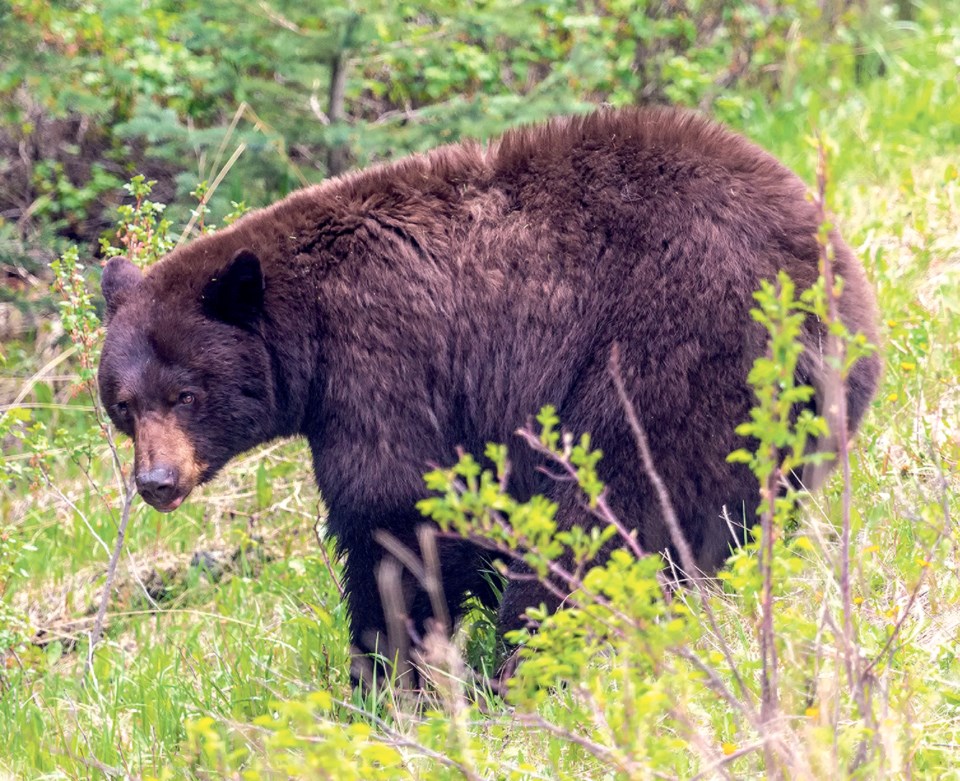BANFF – A fed bear is a dead bear.
Colleen Campbell, a member of the board of directors for the Bow Valley Naturalists (BVN) and a bear researcher, said this long-held expression is truer than ever, noting there is seldom a happy ending for grizzly or black bears that get into human food or garbage.
“It usually leads to premature death – almost 100 per cent of the time,” she said. “That’s the truth and yet it continues to happen.”
Last week, a black bear snacked on a tasty evening dinner left by campers at Rampart Creek, located along the Icefields Parkway about 88 kilometres north of Lake Louise in Banff National Park.
The incident forced Parks Canada to put a special bear warning in place on June 20 for the area around Rampart Creek and Hostelling International-Rampart Creek Wilderness Hostel.
“The bear did obtain a food reward from a campsite,” said Mark Benson, acting human-wildlife management specialist for Lake Louise, Yoho and Kootenay field unit. “It wasn’t deliberately fed and it wasn’t garbage; it was human food, an evening meal left unattended for a short period of time and the bear obtained it.”
Parks Canada was quick to respond to reports and staff have been doing regular patrols of the area. The incident is being investigated.
The warning will stay in place until further notice given that this bear and several others are frequenting the area.
Once a bears gets a taste for human food and garbage, wildlife experts say they may return again and again in search of that easy snack, which can lead them down the dangerous path to food-conditioning.
“It’s very important to realize that once bears, which are very opportunistic feeders, have success obtaining food that may alter their behaviour to seek out a similar source again,” Benson said.
“We want to reduce any potential interaction between people and wildlife, and we certainly want to avoid a bear becoming food-conditioned, for the safety of wildlife and for the safety of people.”
As visitation continues to grow in Banff National Park, reaching more than 4.1 million people in a typical year outside the COVID-19 pandemic, there are more and more negative incidents involving people and wildlife over time.
Campbell said this is a worrying trend, noting Parks Canada should send a strong message by charging and fining people for feeding wildlife or leaving food and garbage unattended.
“The time for warnings is over. I think we also have to stop saying ‘please’ to visitors and be more directed in what we are saying,” she said.
“We need way better, more direct education, on how to be a good citizen with all the wild animals, on what is the best behaviour we can have so we don’t cause their death.”
In order to help bears stay wild, Parks Canada warns visitors to store all food, garbage, and anything with odours inside a vehicle or in secure storage lockers provided at campgrounds.
In addition, garbage or liquids should not be dumped in fire pits, food and garbage must be disposed of in a proper receptacles, and it is mandatory to keep pets on leash at all times.
“We want to make sure that all users of the park are contributing to the concept that animals in the park are wild animals,” Benson said.
Parks Canada also asks that all bear sightings or incidents be reported immediately to a visitor centre or by calling Banff dispatch at 403-762-1470.
“We place high importance on responding to these incidents as quickly as we can,” Benson said.
“If we can get notified of an incident early on in the situation, that often allows us to mitigate a situation before it escalates.”
Read more from RMOToday.com



